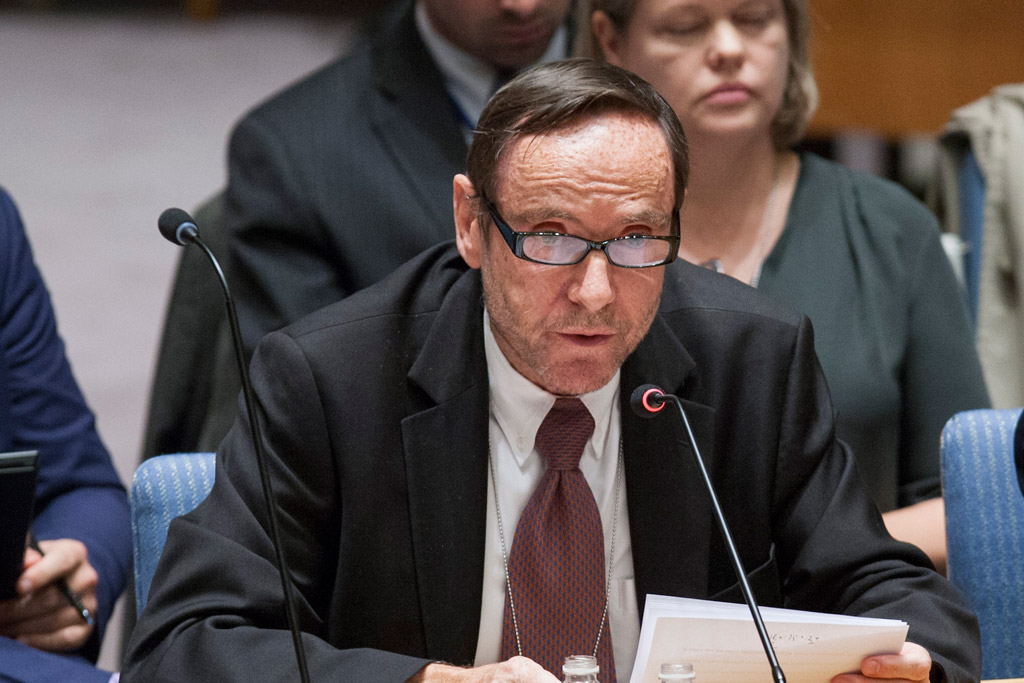April 20, 2024 08:58 (IST)

UN tribunals crucial for delivering justice for Rwanda: UNSC
New York, Jun 6 (IBNS): What began as 'bold experiments' in international justice two decades ago have resulted in ensuring accountability for the worst of crimes, officials from the United Nations tribunals dealing with the former Yugoslavia and Rwanda told the United Nations Security Council (UNSC) on Thursday, as they highlighted ongoing efforts to bring the work of their respective bodies to a close.
This past April marked 20 years since the genocide in Rwanda, where some 800,000 men, women and children – overwhelmingly Tutsi, moderate Hutu and Twa – were systematically killed over the course of 100 days.
Also this year, 8 November marks the 20 anniversary of the International Criminal Tribunal for Rwanda (ICTR), which was established by the Council, at the request of Rwanda, in the wake of the tragedy.
“The development of Rwanda’s judicial system, including holding accountable those who participated in the atrocities in 1994, remains a crucial part of the peace and reconciliation process in Rwanda and there can be no question that the ICTR has played an important role as an accountability mechanism,” said Judge Vagn Joensen, President of the ICTR.
“It is a testament to Rwanda’s dedication to accountability that as the Tribunal draws near to closure, Rwanda is now in the process of trying two cases referred by the ICTR and has taken over responsibility for six of the remaining fugitives,” he added in his briefing to the Council.
“We hope that the international community will use this occasion as an opportunity to mark Rwanda’s achievements, as well as to further study the lessons learnt from what was only an experiment in international justice in 1994,” he said.
“This great experiment has faced some adversity over the years, but it has also proven to be an integral part of the evolution of post-conflict justice.”
Justice Hassan B. Jallow, Prosecutor of the ICTR as well as of the Mechanism for International Criminal Tribunals (MICT), said that as the Tribunal prepares for its imminent closure and the complete takeover of its functions by the Mechanism, it is important to recognize, “despite many achievements, much remains to be done to bring the process of legal accountability to a proper end.”
In particular, he said Member States need to cooperate with and support the Mechanism and Rwanda to ensure that the nine remaining fugitives are arrested and transferred to the appropriate jurisdiction for trial, and that the many persons suspected of involvement in the genocide who could not be indicted by the tribunal need to be extradited to Rwanda for trial or prosecuted by the States where they reside.
Also, witnesses who require protection need to be secured against those seeking to subvert the process of justice, and those who have been acquitted or have finished serving sentences need to be assisted with resettlement. “These are all matters in which only Member States can provide solutions,” said Judge Jallow.
Judge Theodor Meron, President of ICTY as well as the MICT, noted that international courts on their own cannot resolve long-running historical conflicts. They must be part of a “panoply of transitional justice measures,” including broader societal efforts, spearheaded by community leaders, focused on history, memory, responsibility, and respect for the rule of law.
“The need for such a broader approach should not, however, detract from our appreciation for the groundbreaking role of the Tribunal and the valuable contributions made by international criminal justice more generally,” he stated.
“Ensuring accountability for the worst of crimes and respect for the rule of law sometimes is not easy, and it certainly is not cost-free. But it is essential,” he stated.
ICTY Prosecutor Serge Brammertz reported that his office has finished presenting its evidence in all of the remaining trials. “We are now well and truly in the final phase of our work,” he stated.
A key feature of the Tribunal’s completion strategy has been the transfer of some cases to national jurisdiction. “We will continue encouraging national authorities, especially in Bosnia and Herzegovina, to take full advantage of the resources available to them within my office to ensure accountability for the crimes committed,” said Brammertz.
“More broadly, we know that finding creative and effective new strategies for building national capacity is a priority area if we are to construct a more coherent and complete international justice system.”
(President of the International Criminal Tribunal for Rwanda (ICTR) Vagn Joensen. UN Photo/Amanda Voisard)
Support Our Journalism
We cannot do without you.. your contribution supports unbiased journalism
IBNS is not driven by any ism- not wokeism, not racism, not skewed secularism, not hyper right-wing or left liberal ideals, nor by any hardline religious beliefs or hyper nationalism. We want to serve you good old objective news, as they are. We do not judge or preach. We let people decide for themselves. We only try to present factual and well-sourced news.
Support objective journalism for a small contribution.
Latest Headlines
Retaliatory spiral in Middle East must end, says UN chief António Guterres after reported strikes on Iran Sat, Apr 20 2024
Iran claims to have shot down several drones launched by Israel in retaliation attack Sat, Apr 20 2024
Canada: Police investigation link a vehicle used in armed carjackings in Greater Toronto Area Fri, Apr 19 2024
Cambodian authorities extradite 130 Chinese nationals over cybercrime, online fraud Fri, Apr 19 2024
Amid political unrest, Pakistan Army reaffirms its dominant role Fri, Apr 19 2024
US vetoes Palestine’s request UN's full membership Fri, Apr 19 2024







